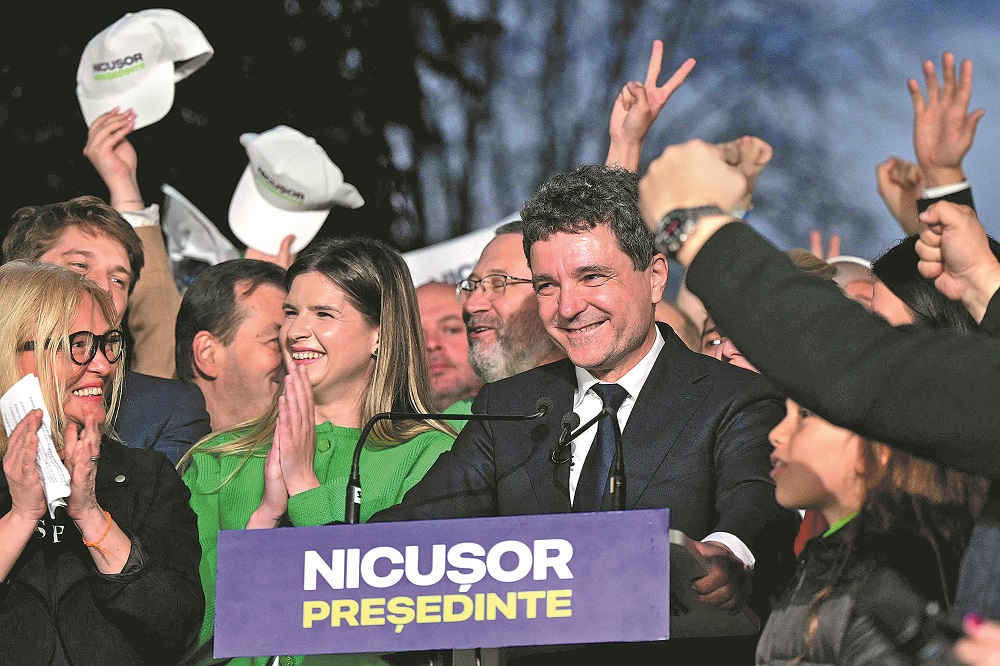Centrists gain ground in 3 EU countries
Parties see wins in Romania, Portugal, while Polish election enters 2nd round


Sunday elections in three European Union member states — Romania, Poland and Portugal — show that centrist parties are favored by voters.
In Romania, Nicusor Dan, 55-year-old mayor of capital Bucharest since 2020, won by an 8 percentage point majority over his opponent George Simion, who conceded defeat early on Monday after initially declaring himself the winner on X.
It came as a surprise since Dan was a distant second in the first round of election two weeks ago.
With 99.8 percent of polling stations counted by 1:50 am on Monday, Dan had won 53.8 percent to Simion's 46.2 percent. The turnout of 65 percent was the highest since 1996.
"Elections are about communities — and in today's elections a community of Romanians who want a profound change in Romania won," said Dan, a mathematician by training before entering politics about 10 years ago.
"It's a moment of hope."
Simion, 38, thanked his more than 5 million voters and promised not to disappoint them in the future. In the first round of the election, he led with 41 percent of the vote, almost double Dan's 21 percent.
"We were alone against a whole system, alone against everybody. I'm proud of you and I hope I represented you with honor," he told supporters.
"It's a bitter feeling, but this election is just the beginning."
European Commission President Ursula von der Leyen congratulated Dan, considered a pro-EU politician, on his victory.
"They (Romanian people) have chosen the promise of an open prosperous Romania in a strong Europe," von der Leyen wrote on X.
"That's a relief," Carl Bildt, former Swedish prime minister and co-chair of the European Council on Foreign Relations, wrote on X after two exit polls predicted a win for Dan.
Glenn Greenwald, a famed journalist and author, criticized the West for nullifying Romania's election earlier because their disfavored candidate won.
"Then, polls show he'd win in the do-over, so they just banned him from the ballot. Now their puppet candidate finally won, and they claim 'democracy' has triumphed," Greenwald wrote on X, referring to the election win in November by Calin Georgescu, a politician and agronomist who was described by Brussels as "far-right", "pro-Russia" and "anti-NATO".
Telegram founder Pavel Durov revealed that a Western European government approached the messaging app asking it to silence conservative voices in Romania ahead of the elections.
"I flatly refused," he wrote on X, without naming the country. In another post hours later, he named Nicolas Lerner, the head of French intelligence, as the one asking him to do that.

Initial victory
In Poland, Rafal Trzaskowski, 53-year-old mayor of capital Warsaw since 2018, won the first round of the country's presidential election on Sunday against rival Karol Nawrocki, who is viewed as a right winger.
Trzaskowski, part of Prime Minister Donald Tusk's Civic Platform party, won 30.8 percent of the vote while Nawrocki obtained 29.1 percent, according to an Ipsos exit poll on Sunday evening after voting ended. The two will face off in the second round on June 1.
"This result shows how strong and determined we need to be to win the presidential election," Trzaskowski told supporters on Sunday evening.
In Portugal, the ruling center-right coalition Democratic Alliance won 32 percent of the vote in Sunday's general election, making it the strongest political force in the country. Its 89 seats in parliament are still far fewer than the 116 seats needed for a government majority.
Chega, which is viewed as a far-right party in the EU, earned 22.56 percent. The Socialist Party won 23.38 percent.
Agencies contributed to this story.
























